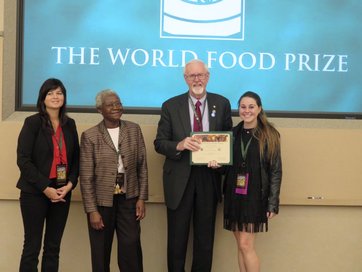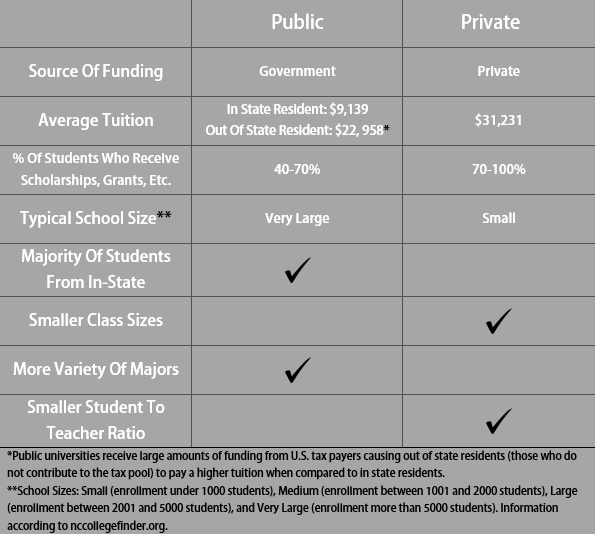 Amanda Dybal Staff Writer Apex High School student, Ashling Murphy, was nominated to join the two hundred other students in the World Food Prize Global Youth Intuition from Oct. 13-15, 2016, in Des Moines, Iowa. These students from over thirty states and Canada, China, India, Mexico, Pakistan, Philippines, and Tunisia, got to be a part of this experience. They collaborated with each other, presented ideas, and packaged meals for Outreach Inc. The theme of this year’s World Food Prize Borlaug Dialogue International Symposium was “Let Food Be Thy Medicine.” Murphy has the honor to present her own research paper on “Feeding Innovation, Fighting Hunger” about the food issues around the globe. She discussed her paper with experts of science, experts in industry, and policy around a roundtable. The Global Youth Institute of the World Food Prize explains, “teacher mentors register their student(s) to participate in a qualifying State Youth Institute (if the student resides in Arkansas, Indiana, Iowa, Michigan, Minnesota, Nebraska, New York, South Dakota, Ohio, Texas and Wisconsin) or apply for an at-large delegate seat at the Global Youth Institute (if the student resides in another state or country). The students then research and write a short research report on a critical food security issue under the direction of their teacher mentor.”  Meenakshi Sathish Editor-in-Chief The earliest early action and decision deadlines are coming up within the next two weeks. Some seniors are prepared for this while others still have not gotten the memo about what Common App is. My grievances go out to those who are writhing in the pain of stress, but hope is not lost. Finishing, or starting for some people, college applications may seem like an impossible task given the small window of time, but nothing is possible and thinking so is not helping anyone. The best way to start knocking down things that need to be done is by creating a list of things to do. Here is a list of things a senior must do before sending off college applications. Create a Common App account: The great thing about Common App is that if you plan on applying to seven different schools, you don’t have to write out seven different applications. With the Common App the questions that every college needs are all put on one page, and they are all sent off to all the colleges of choice with the click of one button. On this site, the applier can also request recommendations, and write their essays. It is so easy that a baby could do it. With an account on Common App, the rest is pretty self-explanatory, and half the battle is done. One of my recommendations is either sit down with your parent(s), or give them the username and password, so they can fill out some of the questions that you may not know the answer to like questions regarding their employer or income tax. However not all schools are the Common App website. If it is not on the Common App, you can apply on CFNC (if the college is within the state), or chances are that they have their own admissions portal of their website. Call the admissions counselor if you are still lost on where to apply. If you feel like a college resume would better you application, get right to starting/finishing that up as well. Prioritize your colleges This is a little more applicable to those who started their applications earlier but is still nevertheless important. It is also especially important if you are the person who is applying to a good number of schools (ten and up). Figure out, highlight, and star the deadlines of each college, and know what they are each expecting. Many colleges require different supplements than others, and it is important to organize what you need from each school. Diligently plan out the order in which you complete each application, so you are not freaking out at the last minute. Henry McKeand
Editor-in-Chief and A&E Editor When looking back at our high-school experience, it can be easy to reflect on the big moments: your first class, your first school sporting event, your first time going off for lunch, and finally graduation. There is no debating the power that these moments carry; we will remember some of them for the rest of our lives. However, it is the small things, the memories that stick in your mind for no real reason at all, that really shape who we are. There is an understandable tendency to talk about the major milestones, but the seemingly inconsequential things we experience everyday are what define us as students and people, and no one class has provided me with more of these powerful experiences than my time spent on the Apex Legacy. I took Intro to Communications and Mass Media during freshmen year, and it was a great experience. Outside of providing me with some of the most memorable social moments of my four years at Apex, it was invaluable in how it prepared me for journalistic writing and planning. It was completely different from the writing style I had always practiced in my English classes, and I learned a lot about writing efficiently and concisely. There was something extremely satisfying about trying something new with my writing, and I came to love the idea of journalism. Kenison Garratt
Editor-in-Chief and A&E Editor It is a common belief that we go out of life similarly to how we entered it: wrinkly, cute, and in diapers. Well, I suppose the same can be said about high school, in the sense that we come into high school and leave it in the same way. In each case we have to stop and remind ourselves to breathe. Both times we are sad to think of the friends we are leaving behind, but we are excited for the relationships we may discover, and while we may know where we are going, we are still unsure of where our journey will truly take us and who we will meet along the way. Yet we continue onward, putting one shaky foot in front of the other.
Kenison Garratt and Henry McKeand
Editor-in-Chiefs and A&E Editors The biggest student class Apex High has ever had is about to graduate, and while many of them are going to colleges and universities both in-state and out-of-state some have other plans. The graduating class, which has received more than $145,000 in scholarship money (as of the beginning of May) has several students going to work directly after graduating, a couple students going to vocational school for elementary education, and a few students planning to join the Navy, Marines, and Army. One student is even planning a fifty-day road trip after they say their goodbyes to Apex High. But for the majority, attending a four-year school is their plan. These are the schools where you will find Apex High’s graduating seniors next year. Kenison Garratt and Henry McKeand Editor-in-Chiefs and A&E Editors From workaholics to gifted athletes, there's no shortage of personalities at Apex High, but there are some that especially stand out. We surveyed the senior class to see which students they felt make the biggest impressions. Without further ado, here are the 2016 senior superlatives. Kenison Garratt and Henry McKeand
Editor-in-Chiefs and A&E Editors After four years of high school, the senior class has truly been able to get to know the faculty of Apex High. Having spent most of their time in the classroom, a great deal of the memories students will carry on with them into the future will be times shared with their peers and educators seated behind a desk, black lab table, or computer screen. Teachers influence their students significantly, and fortunately, Apex has plenty of incredible instructors. All of the teachers at Apex High have so much to offer their students, but for these specific categories, these were the teachers selected by the graduating class. Here are the results of the 2016 teacher superlatives.  Meenakshi Sathish Staff Writer It has been made clear by teachers, parents, internet bloggers, and other “experts” that the best known way to succeed in life is to get into the best college possible. While this theory is not completely bogus, it is not exactly the path to lifelong prosperity either. As Ms. Odom says, while the reputation of a school does count for something, different schools have different things to offer. If a student is interested in engineering, it would be better to go to North Carolina State University than Columbia University, which excels in its law school and liberal arts. Going to a college that was not a first choice does not hinder a successful career. This is the biggest reason why most students get upset when they find out that they did not get into their dream college.  Sophia Shaikh Staff Writer May has arrived, AP exams are nearly over, and summer is in the air. Everyone is excited to escape the grips of school for a little while, but a strange sickness is spreading through the senior class. Symptoms include laziness, a lack of motivation, constant groaning, over-wearing sweatpants, and overuse of the phrase “Whatever, I’m graduating soon.” This sometimes crippling disease is also known as “Senioritis” and is known to strike every graduating class near the end of the school year. With less than a month to go and postgraduate plans already set up, most don’t feel the need to put any more effort into high school. Why would anyone ever feel this way? For one thing, senior exemptions exist. With no final exam for those with a good attendance record, there seems to be no reason to truly learn and study the material. Especially after AP exams, there doesn’t seem to be any reason to keep trying. Students only feel the need to do the bare minimum to pass the class and move on with life. If senior exemptions didn’t count on attendance, you can bet no seniors would show up at all in this last month. Additionally, everything seems to finally be falling in place after four years of suffering. Most students know where they will be going after high school and have made most of the major decisions regarding college. It seems like things are definite, and they won’t rescind your acceptance unless you fail all your classes, right? Many feel like they deserve to finally relax after working so hard for so long.
Sadly, the truth is that this attitude can in fact have a negative impact on your future. Colleges do receive final transcripts, and significantly lower grades in your final semester make them question your work ethic. The more competitive schools especially watch out for this and won’t hesitate to revoke students falling behind. There are plenty of others on waitlists eager to take your place, so an acceptance to college shouldn’t be taken for granted! Even if your school of choice isn’t as competitive, final transcripts will be tainted by lower grades if you stop trying. Higher grades often lead to higher offers of financial aid, so keep working hard! It’s definitely worth a reduced tuition. If you’ve been infected by Senioritis, what can you do? Is there a cure besides graduation? For now, the one thing you have to cling to is motivation. It’s never too late to build strong study habits again and keep up your grades for one more month. If you’re feeling a little lazy, remember the possibility of losing your offer of admission. Get your motivation from the idea of graduation, which isn’t far off at this point. If you made it through nearly four years, you can make it through one more month. It’s alright to relax a little because you have accomplished so much and come so far, whatever your postgraduation plans may be, but don’t let your Senioritis weigh you down. Stay strong and good luck! We’re almost done! Jessica Dorcelien Staff Writer The terms ‘college’ and ‘university’ are often used interchangeably. The overarching difference between the two is that the programs of a college are narrower and oftentimes have no graduate study options. Universities, on the other hand, are composed of multiple colleges, schools, or departments, making them typically larger institutions with broader alternatives for majors and degree options in both undergraduate and graduate programs. For example, The University of North Carolina at Greensboro houses seven schools and two colleges, including the Lloyd International Honors College. The four-year programs of both, universities and colleges, progress towards the fulfillment of bachelor’s degrees. Public vs. Private There are two overarching types of colleges or universities: public and private.
|
Archives
March 2017
Categories
All
|


